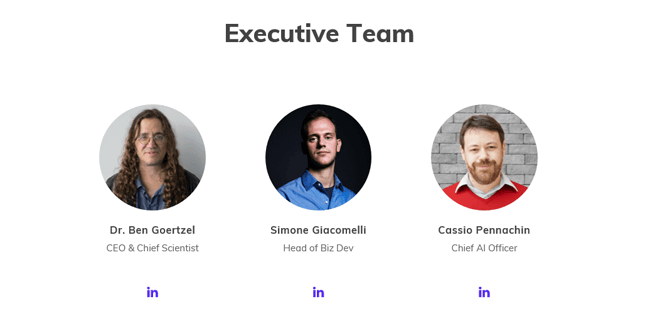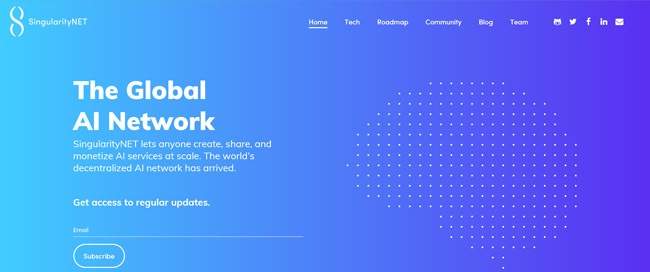If artificial intelligence has some interest for you you’ll also likely be interested in SingularityNET, which is a decentralized blockchain marketplace for artificial intelligence (AI). With the value of AI to businesses becoming increasingly clearer such a marketplace could make it easier for businesses to tap into AI value propositions.
You see, there is an increasingly large gap between the researchers and academics that develop AI tools, and the businesses that want to use them. Most businesses can’t simply use what a project is offering, but need a customized solution.
On the other side of the coin, research projects can have issues accessing a data set that is large enough to create a successful learning machine. SingularityNET wants to be the one to close these gaps and bring research into AI together with business needs for AI.
How does SingularityNET Work?
As a project that brings together the blockchain and artificial intelligence, SingularityNET is quite complex. It’s interesting to note that while the project intends to begin as a marketplace for AI as a service, eventually they plan on becoming a self-organizing AI network. This would be far more complex on the inside, but would appear simple to users as the AI agents in this autonomous network would work together, outsourcing tasks to other AI agents and evolving together to further improve the network. It’s an amazingly ambitious project , but let’s look into the evolving nature of the project and its details to see how it might realize its eventual vision.
AI Services Marketplace
In order to keep things as simple as possible in the beginning, the SingularityNET team has chosen to focus on creating a marketplace for AI services, with a focus on three ares during the initial two years of development:
- Cloud robotics
- Biomedical research
- Cybersecurity
The open AI marketplace being created will allow AI developers to use their own services and AI tools as an exchange for the SingularityNET AGI token, or for other tools and services if they prefer. These exchanges will be made simple transactions through the use of APIs provided by SingularityNET, which will transform standard AI services such as language processing, into smart contracts on the blockchain.
Smart contracts will also be used on the platform for other services, such as creating a matchmaking service for favorable agent exchanges, and for powering the voting system to handle governance issues. The governance model being used by SingularityNET is a DSOC (Decentralized Self-Organizing Cooperative) democracy model, which is similar to the DAO model.
SingularityNET Agents
I’ve mentioned agents several times already, and it’s important to more fully explain what an agent is, and what it does, on the SingularityNET network. The agents are the AI entities executing smart contracts on the platform, and initially will most commonly be network nodes.
Maintaining network validity is one of the key tasks of the agents. In order to do so, the agents rank each other on a binary 0 or 1 scale after each exchange. It isn’t mandatory for an agent to leave a ranking, and rankings can also be automated. The network assumes that a task marked complete by an agent with payment sent deserves a 1 ranking.
Agent ranks go beyond simple reputation scores however. There are other factors that influence and help determine the overall ranking of an agent, including:
AGI Token Staking – Agents need to stake tokens to perform, but if their rating drop below a certain level they will lose some portion of the tokens staked.
Benefit Ranking – This ranking is based on actions performed by the agent that contribute to the improvement of the overall ecosystem. These actions don’t necessarily have any monetary backing, and can be considered as charitable or similar to community service.
External Validation – An external validation by a reputable company (through a Know Your Customer service) can provide additional ranking bonuses for agents.
Self-Organizing AI Internetworking
Long-term, SingularityNET is striving to build a network of AI agent interactions using resources from the OpenCog foundation. The best way to look deeper at this vision is to look at their humanoid robot example, Sophia.

Sophia was designed to use a variety of AI agents to operate. This includes language processing AI agents and other agents to control physical motor movements. Sophia has become increasingly sophisticated as the number of AI agents she can use increases, and as the existing AI agents become increasingly complex.
One simple example of how Sophia works would be to ask her to summarize a podcast you found online. Sophia would then send that request to Agent #1, who can’t do the task itself, but knows from its AI that Agent #2 specializes in analyzing and transcribing audio, while Agent #3 specializes in summarizing text.
So, Agent #1 will pay Agent #2 to transcribe the podcast and Agent #3 to summarize that transcription. Agent #1 delivers the information to Sophia, and she pays Agent #1 for the coordination efforts. While all this is occurring, all of the agents are updating their own AI engines with the new information gained. Thus the AI agents learn as they process tasks, and the cooperation allows the entire system to grow far faster than any individual AI agent could.
If that isn’t enough to give you the shivers, in the future SingularityNET predicts that existing AI agents will be able to create new AI agents on their own to complete specific tasks. As the data on the network grows this will eventually lead to the autonomous network that can self-organize and continue growing.
AGI Token
SingularityNET conducted an ICO in December 2017, raising $32,800,000 as it sold 500 million tokens and reached its hard cap within 24 hours. The full price of tokens during the ICO was $0.10 = 1 AGI, although there were also tokens released as bonuses. 1 billion tokens were minted at the time of the ICO, with the full distribution as follows:
- 500,000,000: Token sale participants
- 200,000,000: Reward pool
- 180,000,000: Founders
- 80,000,000: SingularityNET Foundation
- 40,000,000: Campaign supporters (i.e. bounties)
Once the platform is released the 200 million reward pool tokens will be released to agents who participate on the network over a period of ten years. Once all the reward pool tokens have been distributed there will be a vote to determine if more reward pool coins should be minted, or if some other mechanism should be used.
SingularityNET Review: Team and Progress
The team at SingularityNET consists of more than 50 AI developers, and more than 10 PhD holders. The creator, CEO and lead scientist of the project is Dr. Ben Goertzel, who is also chaiman of both the Artificial General Intelligence Society, as well as the OpenCog Foundation. He also works as the Chief Scientist at Hanson Robotics, a partner company that is helping to make SingularityNET a reality.

The robotic lead and developer of Sophia is Dr. David Hanson, who also founded Hanson Robotics. An of course, Sophia is also a proud member of the SingularityNET team.
The platform is still in its alpha version, and the beta version is expected to be launched sometime in the second half of 2018. You can see the state of various platform features in the project roadmap.
Besides SingularityNET there is only one other Artificial Intelligence blockchain project of which I am aware. That is the DeepBrain Chain hosted on NEO. Long-term both projects have similar visions, but in the short term SingularityNET is unique in creating an AI marketplace since DeepBrain Chain is focusing on shared computing power to perform machine learning.
Trading AGI
With the ICO just being completed in December 2017, the AGI token has only been trading since January 2018. Since it was released on exchanges during the height of one of the biggest cryptocurrency bull rallies, the price rapidly went from $0.54 to a high of $1.85. Since then the entire cryptocurrency market has declined, and as of July 1, 2018 the AGI token is priced at $0.11, where its been sitting for roughly four weeks, indicating it may have found a bottom to await a new cryptocurrency rally.
It’s also likely that the price of AGI will rally once the beta version of the platform is released. News of partnerships with reputable AI or robotics companies could also give the token a boost. And being added to new exchanges always helps lift altcoins such as AGI.
Where to Buy AGI
With AGI being a new token, availability on exchanges is limited. The largest trade volumes are on Binance and BitForex, with much smaller trading volumes seen on Liqui and KuCoin. The token is available on some other small exchanges, but I wouldn’t recommend buying there as volumes are far too small. AGI can be bought with BTC, ETH and USDT. Ethfinex also offers USD fiat purchases of AGI.
Where to Store AGI Tokens
AGI is an ERC-20 token, and will remain so for the foreseeable future, so you can store it in any ERC-20 compatible wallet. Popular options include MyEtherWallet and MetaMask, as well as hardware wallets such as the Ledger Nano S and the Trezor.
If you do own AGI tokens you may want to follow the SingularityNET team on your favorite social media platform or by subscribing to their email list so you won’t miss it if they announce a move from the Ethereum network and the launch of a dedicated AGI wallet.
In Conclusion
The AI services marketplace being planned by SingularityNET is not only unique, it also promises to provide a needed service for businesses who are interested in using AI to improve their operations. And users are obviously keen to see where this project will go, with the ICO hitting its $38 million hard cap in less than a minute.
Even more ambitious is the vision of an autonomous self-directed AI network. If the SingularityNET team can realize that vision this could be one of the most valuable blockchain projects currently in development. Of course it’s far too early to see where the project might eventually end.
I like what the SingualrityNET team has planned and will be keeping an eye on developments as the project progresses. We’ve already seen Sophia making headlines early in 2018, and if this project eventually builds a network of self-sustaining AI agents that can actually create new agents to solve new demands the headlines created by Sophia will be little more than footnotes to the future of the SingularityNET platform.
